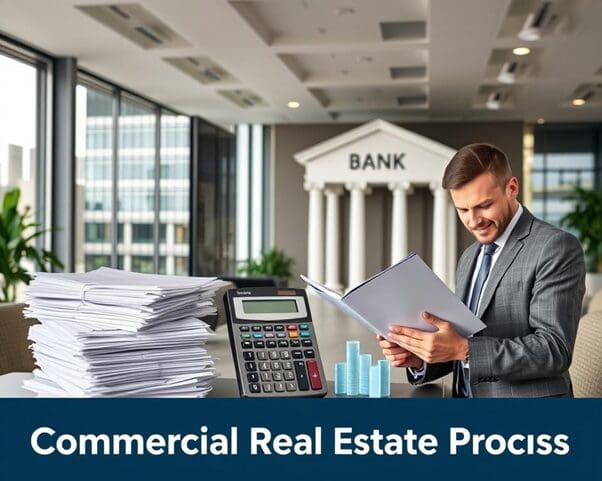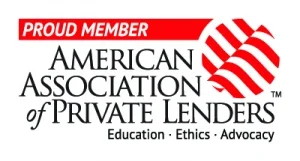Imagine getting the perfect spot for your business with just one loan. Every entrepreneur and investor in the Texas Gulf Coast needs to know about commercial property financing. Getting a commercial real estate loan involves many steps, like preparing detailed documents and showing your business is financially stable. Texas Gulf Bank, with over 100 years of experience, highlights the value of strong relationships and careful preparation for business loans.

Key Takeaways
- Commercial real estate loans usually need the property to be used by the business, with at least 51% occupancy.
- The minimum debt-service coverage ratio (DSCR) needed is 1.25.
- SBA 504 loans require a 10% down payment and offer low interest rates for 20 or 25 years.
- Credit scores around 660 are usually needed for commercial real estate financing.
- Commercial real estate loans often ask for a 25% down payment.
- Loan-to-value (LTV) ratios for commercial real estate are usually between 65% to 80%.
Understanding Commercial Real Estate Loans
Getting a commercial investment property loan, commercial construction loan, or commercial refinancing is key for business growth. These loans help buy or refinance properties like office buildings and warehouses. They are different from home loans in many ways.
Definition and Types of Commercial Real Estate Loans
A commercial real estate loan is a mortgage for businesses. It can be for buying, developing, or refinancing properties. Loan amounts vary, with a minimum credit score of 625 needed.
Lenders ask for down payments of 15% to 35%. Interest rates can be from 3% to 20%. Some common types include:
- Traditional Term Loan
- Small Business Administration (SBA) Loans
- Real Estate Mortgages
- Hard-Money Loans
Differences Between Commercial and Residential Real Estate Loans
Commercial loans have shorter terms, usually five to twenty years. Their buy rates can start at 1.11% APR. Down payments are often 20% to 25% to meet a 75% to 80% LTV ratio.
Environmental assessments and personal guarantees are also needed. These are not required for home loans.
The Importance of a Commercial Real Estate Loan for Your Business
Getting a commercial real estate loan is vital for business growth. It’s useful for commercial refinancing or buying new properties. This allows businesses to expand or improve their facilities.
For example, Texas Gulf Bank offers strategic loans in the Gulf Coast region. This helps businesses grow by providing the needed funds.
Good credit, a score of 670 or higher, is essential. Most loans also need collateral, showing the importance of a solid financial base.
Types of Commercial Real Estate Loans
Different commercial real estate loans meet various business needs. Each loan has its own benefits and needs, so picking the right one is key. Let’s look at some popular choices.
Traditional Term Loan
Small businesses often choose traditional term loans for their fixed payments. They’re great for big purchases or investments. With interest rates as low as 3%, they’re a smart pick for established companies.
These loans offer predictable finances with terms from 15-20 years. This helps with long-term planning.
Small Business Administration (SBA) Loans
SBA loans are backed by the government, offering good terms. The SBA 7(a) loans can go up to $5 million over 25 years. Down payments range from 10 to 20 percent.
The SBA 504 loans combine CDC and bank loans for up to $5.5 million. Down payments start at 10%. The application might be tough, but the benefits include lower rates and longer terms.
Real Estate Loans and Mortgages
Commercial lenders provide real estate loans for property purchases. These loans need down payments up to 45% and may have penalties for early repayment. Terms are usually 15-20 years, but can be as short as 5.
The appraisal and approval depend on the property’s value and rental income. Real estate loans can be profitable but need careful consideration.
Hard-Money Loans
Hard-money loans are for quick funding, often bypassing traditional loans. They’re based on property value, not credit, with repayment in one to four years. They finance up to 70% of the property value.
They’re good for businesses needing fast cash. For more on hard-money loans, check out how they work.
Choosing the right loan depends on your business’s needs and finances. Traditional and SBA loans offer stability, while hard-money loans provide speed and flexibility.
Key Steps in Applying for a Commercial Real Estate Loan
Getting a commercial real estate loan needs careful planning and knowing the loan requirements. These steps will help you apply successfully and get better loan rates.
Preparing Necessary Documentation
First, you need to gather important documents for your loan application. Lenders usually ask for:
- Financial statements
- Tax returns
- Environmental assessments
- Business model overviews
Having these documents ready shows your business is stable. It also prepares you for the lenders’ checks. These documents prove your business meets the 3 C’s: credit, cash flow, and collateral.
Choosing the Right Lender
Finding a lender that fits your needs is key. Different lenders offer different terms and service levels:
- Texas Gulf Bank: Known for personalized services.
- Texas Security Bank: Offers flexibility for diverse business types.
There are many types of lenders, like commercial banks and private lenders. Comparing rates and terms from several lenders can help you find the best one for you.
Understanding Loan Terms and Conditions
It’s crucial to understand loan terms and conditions well. Key things to look at include:
- Interest rates
- Repayment conditions
- Debt service coverage ratio (DSCR)
- Loan-to-value (LTV) ratio
These factors affect your loan rates and whether it fits your business goals. Carefully reviewing these will help ensure the loan is right for you.
How to Get a Commercial Real Estate Loan
Getting a commercial real estate loan needs careful planning and knowing the financing world. I’ll show you the key steps to get business real estate loans.
First, find the loan that fits your needs. There are many types, like purchase, construction, and refinance loans. Each has its own purpose and rules, so pick the right one for your business.
Then, prepare a detailed application. You’ll need financial documents, a business plan, and property details. Lenders, like Texas Security Bank, want your application to show your business’s unique points.
Choosing the right lender is crucial. SBA loans are great for small businesses. Look at lenders like Lendio, which require $50,000 in annual revenue and a good credit score.
It’s also important to understand loan terms. Lenders check your credit, revenue, and debt-to-income ratio. Meeting these criteria can help you get approved.
Improving your credit score and showing good collateral can help too. A solid business plan shows your business’s potential and stability, making lenders more likely to approve your loan.
Finally, be aware of the loan process’s timeline and costs. Closing can take about 44 days, and fees vary. Plan for origination, appraisal, and legal fees for a smooth process.
By following these steps, you can increase your chances of getting the right loan for your business. This will help your business grow and succeed.
Commercial Loan Requirements
To get a commercial real estate loan, you must meet certain criteria. These rules help lenders feel secure and offer good loan terms. Here’s what lenders usually look for:
Business Financial Health and Documentation
Lenders check the business’s financial health closely. They look at profits, cash flow, and how well the business can pay its debts. The loan-to-debt ratio should be under 75%, and the business should have at least 20% more income than debt.
They need to see financial statements and tax returns. This proves the business’s financial health.
Personal Finances and Credit Score
Personal finances and credit scores are also important. Lenders want to see a good credit history for reliable payments. Having a guarantor with good assets and income can help get the loan.
Small businesses are watched more closely because they might fail more often. So, it’s key for entrepreneurs to have strong personal credit.
Property Characteristics
The property’s features are also key in getting a loan. Properties mostly used by the owner are seen as safer, leading to better loan terms. But, investment properties are riskier and harder to finance.
Lenders might need an appraisal to check the property’s value. They might also do environmental checks to assess risks. Meeting these needs is crucial for a quick and easy loan approval.
Understanding commercial loan requirements can greatly improve your chances with lenders. It opens the door to financing that fits your business’s needs.
Commercial Real Estate Loan Rates and Costs
Knowing about commercial real estate loan rates is key for businesses looking to borrow money. These rates change based on the borrower’s credit, the business type, and the collateral. Commercial loan rates are usually higher than home mortgage rates, so it’s important to shop around.
Factors Influencing Loan Rates
Several key elements affect commercial real estate loan rates:
- Credit Score: A higher credit score can significantly reduce your interest rate.
- Property Type: Different types of properties carry different risk profiles, influencing rates.
- Loan Term: Longer loan terms typically feature higher interest rates.
- Market Conditions: Economic factors can impact rates, as seen with recent Federal Reserve policies raising rates to combat inflation.
These factors together affect the interest rates for different loans. For example, conventional loans have rates from 5.87% to 10.00%. Construction loans range from 9.50% to 14.50%. Knowing these details helps in making a smart choice.
Comparing Loan Offers
To get the best commercial real estate loan rates, compare offers from different lenders:
- Traditional Banks: Offer long-term financing options and potential discounts for existing customers, with rates for a 10-year term ranging from 5.88% to 7.88%.
- Non-Bank Financial Institutions: Provide quicker approvals and more flexible underwriting standards, though at a higher cost, often surpassing 14% for bridge loans.
Comparing carefully helps understand interest rates and total costs. Fees like appraisal, origination, and prepayment penalties can add up. So, it’s crucial to evaluate all costs.
By looking at these factors and comparing loans, businesses can find the best deal for their financial situation and real estate goals.
Top Commercial Mortgage Lenders
Finding the right funding for commercial real estate is key. You have many lenders to choose from, like banks, non-bank institutions, P2P marketplaces, and SBA partners. Knowing the differences can help you make the best choice for your loan needs.
Bank Loans
Big banks like U.S. Bank and Bank of America are solid choices. U.S. Bank offers loans from five to 15 years with different rates. Bank of America has rates starting at 5.75%, great for businesses with good credit.
These banks also offer SBA loans. They have terms up to 25 years and down payments as low as 10%.
Non-Bank Financial Institutions
Non-bank lenders like RCN Capital and 1West are also good options. RCN Capital offers loans with low monthly payments and long terms. 1West has loans starting at 6% interest, even for businesses with lower credit scores.
P2P Marketplaces
Lendio is a new way to get commercial real estate loans. It connects you with over 75 lenders, offering many loan options. This is perfect for businesses needing quick funding without strict requirements.
SBA-Lending Partners
SBA loans are great for those who qualify. Partners like SMB Compass and U.S. Bank offer up to $20 million for major assets. SMB Compass provides loans with long terms and competitive rates, helping businesses grow and create jobs.
Each lender has its own strengths in the commercial real estate market. Whether you choose a traditional bank, a non-bank, a P2P marketplace, or an SBA partner, knowing your options is crucial. This knowledge helps you make the best choice for your business.
Common Challenges and How to Overcome Them
Getting commercial property financing and business real estate loans can be tough. But knowing how to handle these challenges can make it easier.
Improving Financial Health and Credit Scores
One big hurdle is meeting lender standards for financial health and credit scores. Keeping your personal credit score above 700 can really help. It’s also key to keep your debt-to-credit ratio under 30% and pay bills on time.
Also, aim for a debt service coverage ratio of at least 1.35. This shows your business is financially stable. For more tips on getting real estate loans, check out Hard Money Investors.
Dealing with Collateral Requirements
Collateral can be a big issue. Finding and securing good assets, like land and buildings, is crucial. Traditional lenders want tangible assets to ensure repayment.
If you’re a small business without enough collateral, SBA loans might be an option. These loans don’t require collateral but need a solid credit score and a minimum of two years in business.
Navigating the Application Process
The application process for commercial property financing and business real estate loans is complex. It’s important to be accurate with your documents and clear about your business plan. Having precise financial projections is also key.
Getting help from accountants or financial advisors can be very helpful. Working with experienced lenders, like those at Texas Gulf Bank or Texas Security Bank, can also make things smoother.
Benefits of SBA Commercial Real Estate Loans
Looking into SBA commercial real estate loans is key when you need a business loan. These loans offer many benefits that make them a great choice.
One big plus is the competitive interest rates. As of September 2024, rates are between 5.762% and 5.865%. This means your business can budget better, without worrying about rate changes.
The loan structure is also a big advantage. The SBA and CDC provide 40% of the loan, the bank gives 50%, and you only need 10%. This makes it easier for small businesses to get into commercial real estate.
Another benefit is the long repayment terms of up to 25 years. This helps keep your monthly payments low. It also lets you use more of your cash flow for other business needs.
The loan requirements are designed to help many businesses. To get an SBA 504 loan, your property must be mostly used by your business. Your business must also be profitable and meet certain financial standards.
SBA loans are also very flexible. They can help with buying property, building new, making improvements, and even buying heavy machinery. This makes them a good choice for entrepreneurs looking to grow.
Lastly, SBA loans can help your business grow faster. They offer tax savings, below-market rates, and fixed costs. These benefits can help your business compete with bigger companies.
For more information on getting a commercial real estate loan, talk to a financial advisor. They can give you advice that fits your business’s needs.
Conclusion
Getting a commercial real estate loan is complex. It needs careful planning and understanding of key points. You must know about different loan types and what lenders look for. Also, checking the financial health of your business and its owners is crucial.
With the right steps, like having all your documents ready and a solid business plan, you can get the loan you need. Banks like Texas Gulf Bank and Texas Security Bank can help a lot. They have teams with lots of experience to guide you.
Some important facts to remember are the interest rates, which can be as low as 6.25%. You might need to put down 10% to 30% of the property’s cost. Lenders usually lend up to 75-80% of the property’s value and want a credit score of at least 650.
The application process can take 30 to 90 days. This shows how important it is to be ready and organized.
Knowing what lenders need is key. This includes details about the property, your business’s finances, and having all the right documents. The appraisal, financial statements, tax returns, and a detailed business plan are all important.
For more help, you can contact Tidal Loans LLC at 832-757-1262 or email them at info@www.tidalloans.com. I hope this guide helps you feel more confident and clear about getting a commercial real estate loan.


